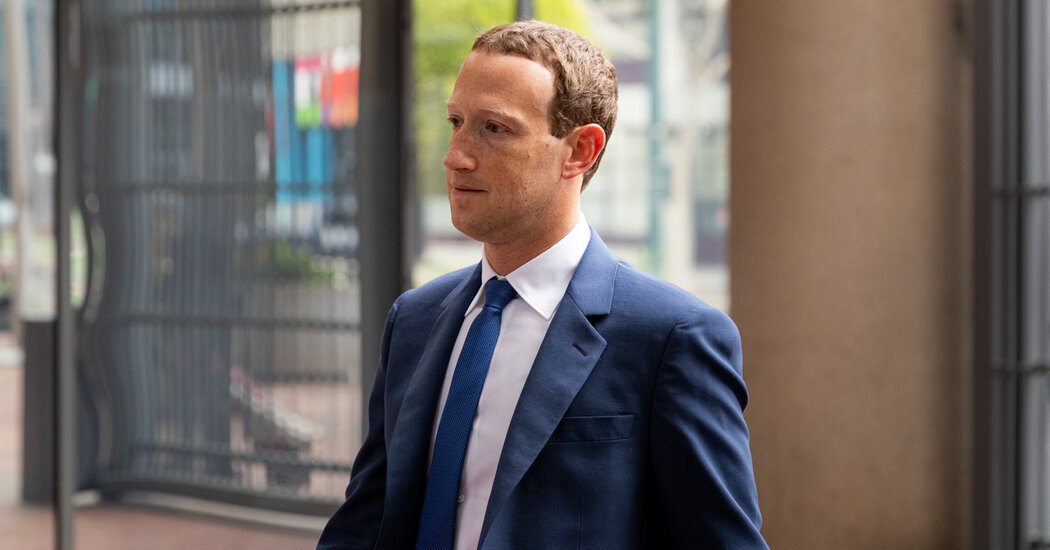Mark Zuckerberg has spent the past nine months against the ropes as his company made major headcount cuts and struggled to gain mainstream traction with its ambitious virtual reality plans.
On Thursday, he told Meta employees how he planned to get the company back on track. At an all-hands meeting, Mr. Zuckerberg explained the recent layoffs and outlined for the first time a vision of how Meta’s work in artificial intelligence would merge with its plans for the virtual reality it calls the metaverse.
Mr. Zuckerberg’s speech was an attempt to rally the workforce after the most tumultuous period in his company’s 19-year history. The CEO said he was making “tough decisions” about layoffs with the goal of “building a better tech company” that delivered better products faster — something he believed Meta was not doing right as it grew to more than 80,000 at its peak employees of the pandemic.
“I want us to use this period, which will be a little bit more stable, to evolve and rebuild our culture,” he said, according to two people who attended the meeting and shared comments and a recording with The New York Times.
Mr. Zuckerberg delivered the remarks in a roughly half-hour speech to thousands of employees on the campus of Meta’s Menlo Park, California. The talk, held in an outdoor pavilion the company calls Hacker Square, was also streamed live to tens of thousands of employees around the world.
It was one of Meta’s few major all-hands meetings in the past three years that were held in person, and included presentations from other Meta executives, such as Andrew Bosworth, the chief technology officer, and Chris Cox, the chief product officer.
During the presentation, Mr. Cox Meta’s plans to make improvements to Reels, Instagram’s short video product, to better compete against TikTok, one of Meta’s most formidable competitors.
Executives also talked about Project 92, a long-rumored social app in development at Meta that will operate similarly to Twitter. The app, executives said, will work with other apps like Mastodon and Bluesky.
While Meta has been working aggressively on AI for several years, it’s been slower than competitors like Google and Microsoft to turn that research into consumer products. Mr. Zuckerberg detailed plans on Thursday for artificially intelligent assistants that will help people across all Meta apps, including WhatsApp, Messenger and Instagram.
He said Meta would work to create artificial intelligence models that would be accessible to more people than those of his company’s competitors and would eventually fit into his plans for the metaverse.
“There’s a lot of value in democratizing access to this,” Mr. Zuckerberg said, according to the two people who shared comments with The Times. “But it’s also in line with the product vision to enable many different AIs instead of just trying to consolidate this ourselves into a single AI that’s going to try and rule everything.”
He envisioned AI assistants helping people “create content to express yourself and your ideas so much better”, or perhaps an artificially intelligent version of “a coach who advises you, encourages you”.
AI agents could serve customers in products like WhatsApp, the globally popular messaging app that Meta has focused on turning into an important business and customer service tool. And every company could use a personalized AI algorithm.
“Different people have different interests, and we need a diverse array of AIs to represent all these different interests,” Zuckerberg said at the meeting.
To do that, the company is betting heavily on open source technology, meaning it will share its artificial intelligence work with researchers who want to build their own algorithms using what Meta has already done. The company has spent billions over the past decade building systems for AI and recruiting top researchers to work on some of the world’s toughest computer science questions around AI
Meta has been criticized for its approach. Researchers and politicians outside the company say opening up AI algorithms to many others could spawn malicious, automated and intelligent systems that accelerate the spread of misinformation. Those sophisticated algorithms, critics say, should be rigorously scrutinized.
In his speech, Mr. Zuckerberg Meta’s strategy. He said open-source software allows more remote control of the technology because it can be seen by millions of technologists. He said working closely with outsiders’ advancements would improve Meta’s platforms.
Mr. Zuckerberg also said he hoped for a world where people could build as many different AI programs as they wanted, rather than relying on a few of two or three big tech companies.
That doesn’t mean Meta is shying away from its eponymous metaverse plans, Mr. Zuckerberg said. Programs that use new generative AI technology, he said, could ultimately help people build new items and experiences in the virtual world. And he hinted that the company could bring its AI assistant into a future version of its smart glasses. (Meta released Ray-Ban smart glasses in 2021, though sales have been slow.)
He also took a swipe at Apple’s recently announced Vision Pro headset, a $3,500 pair of high-tech glasses that promised to usher in a new era of “spatial computing.”
“I was very curious to see what they would ship, and it’s a good sign for our own development that they don’t have any magical solutions to the laws of physics that we haven’t explored yet,” he said in his remarks. . Mr. Zuckerberg criticized the device’s high-quality materials and cost, noting that Meta had spent years lowering the price of its headsets to an upcoming version that will start at $500.
“Their announcement really shows how our vision and values differ and what is at stake in shaping this platform,” said Zuckerberg. “Our vision of the metaverse and presence is fundamentally social and is about people interacting and feeling closer together in new amazing ways. In contrast, every demo Apple showed was someone sitting alone on a couch.”

